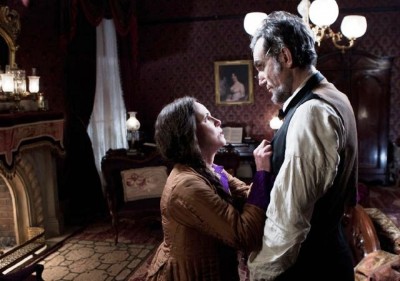
Steven Spielberg may be our most sincere and inoffensive filmmaker. While this simple earnestness is likely the key to big swaths of his popular success, it doesn’t often make for interesting filmmaking. It should come as no shock then, that with Lincoln we get Spielberg at his most heartfelt as he tackles the solemn subjects of slavery, freedom and perhaps America’s most beloved statesman, Abraham Lincoln. Unfortunately, a very serious Spielberg is perhaps the worst kind of Spielberg since what we get in return is a movie awash in technical skill, but stylistically inert and lacking in imagination. This is exactly the type of treatment one might expect for a Lincoln biopic and all the weighty topics it carries with it, but this doesn’t inherently make it entertaining (or engrossing) as Lincoln’s good will is set on attacking your head and mistaking it for your heart.

Luckily, Daniel Day-Lewis — as Lincoln himself — puts in a great performance that single-handedly keeps the film afloat. This is a different Day-Lewis than we’ve seen in quite a while, straying from the monstrous sociopaths we’ve seen him play in Martin Scorsese’s The Gangs of New York (2002) and Paul Thomas Anderson’s There Will Be Blood (2007) to become something more genteel. But the genius of his Lincoln is also the genius of his Bill the Butcher or his Daniel Plainview — he takes these people who are larger than life (and in the case of Lincoln, there are few figures in American history larger) and humanizes them, making them relatable as people. There’s a concerted effort to stray away from the elementary school idea of Honest Abe, and instead present Lincoln as a good, charismatic man, but also a conniving — even devious — politician.

Tony Kushner’s (Munich) screenplay makes the wise decision of showing just a small part of Lincoln’s life, as America is in the full throes of the Civil War, and as he pushes — by any means necessary — to ratify the 13th Amendment and make slavery illegal. But it’s also dependent on a lot of ornate speechifying in dimly lit rooms, and a heavy dependence on the abilities of the film’s cast. This is where Lincoln stands on truly shaky ground, as there’s a shockingly wide variation in how everyone fares. Of course, you have Day-Lewis doing the bulk of the heavy lifting, while Joseph Gordon-Levitt and (surprisingly) James Spader are excellent. On the other hand, you’ve got the usually reliable David Strathairn and Tommy Lee Jones seeming too modern and never really fitting into this other world. Neither are nearly as bad as Sally Field who seems to be channeling Vivien Leigh in Gone With the Wind and has Oscar statues floating in her eyes.

Spielberg seems content on shooting everything in murky, washed-out grays (certainly to show how serious a time this was) that does neither the actors nor Kushner’s literate, intelligent script any favors. Even with the immersion in period and vague, never-sketched-in nods to America’s current political climate, the film is uneven, faltering whenever Day-Lewis is off screen, working less as a movie and more like a history lesson. Rated PG-13 for an intense scene of war violence, some images of carnage and brief strong language.
Playing at Carolina Asheville Cinema 14, Epic of Hendersonville, Regal Biltmore Grande, United Artists Beaucatcher Cinema 7





UGH…. I just read Mountain Xpress’s review of Lincoln and just about spit my coffee on the page. Mr Souther, I think you missed the point about the movie from a historical standpoint. “Lincoln” wasn’t about the ratification of the 13th Amendment abolishing slavery; instead, it just focused on obtaining the congressional votes on the proposed amendment in early 1865, which would go forward for ratification by the states at a later date. The amendment wouldn’t complete ratification by the states until December 1865, which probably passed in some ways through the martyrdom of Lincoln’s death.
Did anyone else think Lincoln came off as a little Reaganesque for much of this movie? Lots of digressive, grandfatherly anecdotes in the middle of serious conversations…
On the other hand, you
Did anyone else think Lincoln came off as a little Reaganesque for much of this movie? Lots of digressive, grandfatherly anecdotes in the middle of serious conversations…
Can’t say it occurred to me, but I usually try my damndest to block all memory of Reagan. At the same time, I don’t think Reagan invented that means of expression.
“Lots of digressive, grandfatherly anecdotes in the middle of serious conversations…”
Critics and sycophants alike have remarked on Lincoln’s reliance on folksy metaphor to promote his agendas. His anti-intellectualism has always drawn the drawn the ire of the prententious, psuedo-intellectual political elite, and ironically aligned them with more conservative Confederate Nationalists, both then and now.
Strange bedfellows, indeed.
I’ve never thought of it as anti-intellectualism per se, but I can’t think of any characterization of ol’ Abe that doesn’t use the folksy humor approach.